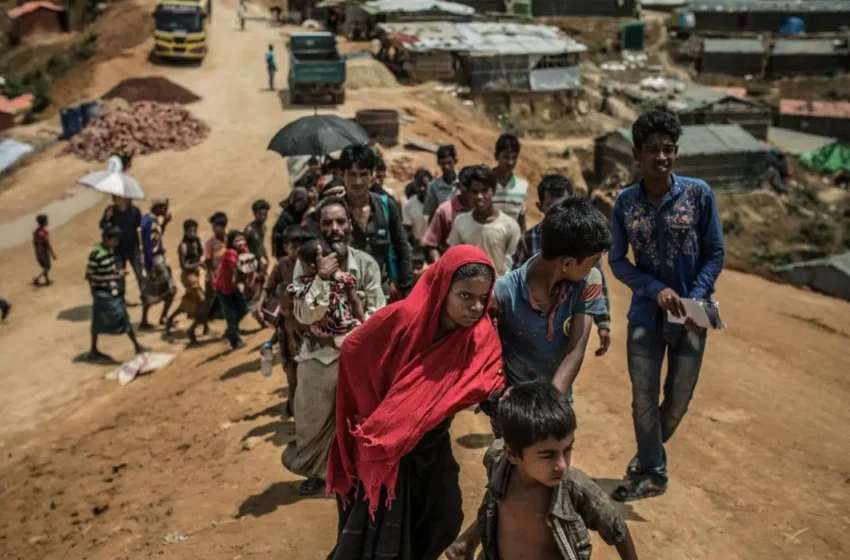
Holding the Unseen Stress: Low-income Countries and the Refugee Crisis
By the year 2025, the refugee crisis around the world expanded into unfathomable proportions with a total of over 123 million people forcibly displaced. Conflict lingers both in Sudan and Ukraine, and climate disasters only add to the displacement. Approximately 73% of refugees are hosted in low-and-middle-income countries that continue to suffer hard cuts to humanitarian assistance and have received very limited real support from other international actors.
This analysis will highlight some of the unique pressures on low-and-middle-income countries, the systemic failings that feed the crisis, and the need for high-income countries to make a real contribution to shared responsibility.
The Reality of Displacement and Hosting
Record Highs, Unequal Hosting
Global Displacement: As of April 2025, 122 million people displaced forcibly from their homes globally, including 42.7 billion are considered refugees. In the past 10 years, it has doubled in total number.
Inequitable Hosting: Close to 73% of refugees are living in poorer countries and the impact on that country’s economy and resources would be enormous. In Bangladesh, for example, almost 1 million refugees from the Rohingya population are living in Cox’s Bazar (the largest refugee settlement in the world).
Youth: Education and health services are no longer available to almost 47 million displaced youngsters. Once more, 83% of Rohingya youngsters in Bangladesh have not had access to a formal education.
Top refugee sending crises (2025):
- Syria: 933,000 refugees are in need of resettlement
- Afghanistan: 558,000 refugees
- Sudan: 172,000 refugees displaced due to the fighting
- Myanmar (Rohingya): 226,000 refugees, many stateless and persecuted.
The Resettlement Gap: Systemic Failure
Increasing Needs vs. Diminishing Solutions
- In 2025, UNHCR projects that 2.9 million refugees will need resettlement in 2025—20% more than 2024. This increase is primarily due to protracted conflicts, the impact of climate change and new crises.
- Global Shortfall. In 2024, only 96,311 refugees were resettled in the world from among millions in need—less than 5%. While the U.S., Canada, Germany, and Australia resettled the most refugees, this voluntary response does not come anywhere near closing the gap.
- US Admissions Cap. For FY2025, the U.S. is suggesting that, despite relocation demands, just 30,000–50,000 refugees from Africa and 35,000–50,000 from Latin America be admitted.
Why Resettlement Matters
Resettlement is a “life-saving intervention” (UNHCR) that eases pressure on host nations. When resettlement fails:
- Refugees risk dangerous irregular migration.
- Host communities face unsustainable strain on infrastructure and services.
- Xenophobia and exploitation escalate, as seen in rising deportations and violence.
Humanitarian Funding Cuts: Deepening the Crisis
Aid Reductions and Their Impact
- UNHCR’s Funding Gap: The agency needs $231 million for resettlement and complementary pathways in 2025, while various pressures exist against budgets owing to the economic climate globally.
- Consequences: Without money, aid interventions may cease to exist, jeopardizing support for mental health, maternal health, food insecurity etc etc. For example, funding shortfalls in Cox’s Bazar have destroyed education programs, resulting in the “lost generation.”
Climate-Disaster Nexus
Globally, 75% of climate displacement occurs in low-income countries, exacerbating the inflow of refugees to those countries. Host countries such as Sudan and Haiti face compounded conflict and climate disasters with limited resources.
Bangladesh and the Rohingya MN
World’s largest refugee settlement
- Cox’s Bazar, ~1 million Rohingya displaced due to genocide in Myanma
- Education emergency: 83% of Rohingya children have no access to formal education creating a “lost generation”
- Overstrain on host community: Decrease in local resources, deforestation, water insecurity, direct competition are inflaming tensions.
International Community on a Macro Level
Despite the UN putting out an appeal for solidarity in action, resettlement for the Rohingya is almost nonexistent. Justice For All said, “Refugees are not numbers, they are families with dreams,” calling for action, not rhetoric in support of refugees.
Stakeholder Perspectives: Voices from the Frontlines
United Nations
Secretary-General António Guterres:
“Host communities in developing countries shoulder the greatest burden. This is unfair and unsustainable… Solidarity must mean boosting humanitarian support and expanding resettlement.”
UNHCR Assistant High Commissioner Ruvendrini Menikdiwela:
“Resettlement eases pressures on host countries and strengthens refugee protection frameworks. Without it, refugees in acute need are forgotten.”
Civil Society
Justice For All:
“True solidarity means action: honoring refugees’ right to safety, ending conflicts, and investing in host communities.”
Amnesty International:
Condemns “xenophobic policies” that heighten refugees’ risk of violence and deportation.
Host Nations
Low-income countries like Uganda (hosting 1.5 million refugees) and Lebanon (1 in 4 people is a refugee) emphasize the need for:
- Predictable funding.
- Skills-building programs for refugees.
- Expanded labor migration pathways.
The Path Forward: Solidarity in Action
Recommendations for Equity
- Expand Resettlement: Resettlement must expand from the present to 100,000 resettlements per year to help refugees in Australia and New Zealand.
- Fund Host Communities: Provide direct humanitarian assistance to local and NGO governments in low-income countries that are receiving influxes of refugees.
- Develop Complementary Pathways: Develop educational, employment and family unification pathways for refugees.
- Combat Xenophobia: Create campaigns for awareness against discrimination.
- Invest in Integration: Access to education, basic healthcare, and legally permitted work for refugees.
UNHCR’s 2025 Strategy
Data sharing for resettlement with partners for the UNHCR.
Resettle refugees who have the skills for employment pathways.
Advocate to have “regular migration systems” to include refugees into frameworks of regular migration.
The burden on low-income nations to host refugees is a global justice issue. The world is approaching World Refugee Day 2025 under the theme “Solidarity in Action for Refugees” to ensure rhetoric becomes action. There must be resettlement, funding, and policy changes to share the responsibility of wealthy nations. Failure to do so will mean the invisible burden of displacement will continue to disrupt already vulnerable regions and produce further human suffering.


